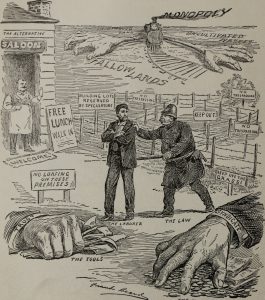
Progressive Era mockery of monopoly power, with a shofar thrown in for holiday relevance.
Over the past year or so, you could be tipsy over all the tipping points that have flown past in in the saga of Big Tech v. its detractors. Pre the 2016 Russia US election cyberwar, only a few fringe groups were worrying about Big Tech monopoly power. Then the election hacking came to light, followed by Congressional hearings in the spring, Trump’s inanely inflammatory Google search engine tweets last week, and hearings set to start in DC tomorrow.
Along with this great awakening to the dangers of the cyber monsters, there has been a bit of an opening of pundit eyes to the dangers of monopolies in general. The techs may be the most obvious examples, but stacks of data support the view that the economy has become less competitive, with numerous industries now dominated by oligopolies or worse.
Tomorrow’s hearings in front of the House Intelligence Committee, and hearings more focused on antitrust issues that will follow, put another Zippo on the fuse. But an event last week, a lot more wonkish and quiet, shows a deeper paradigm-shift in the smart world’s view of tech, monopolies and what we may need to do to change things. The setting was the annual Jackson Hole, WY meeting sponsored by the Kansas City Fed — described as the most important high-level macroeconomic policy conference of the year. This year the main agenda was the impact of corporate concentration on the US economy, and a consensus view seemed to emerge (NYT) that competition has been reduced, and that further, concentration of economic power may help to explain lower overall economic growth and higher inequality. This strikes me as a rather radical conclusion for a group of A-list mainstream economists and policy makers.
The Jackson Hole meeting and the congressional hearings ads to an economic zeitgeist that’s being further shaped by the reflections going on to mark the 10th anniversary of the financial crash. The two big lessons seem to be that 1.) it was a mistake not to bail out Lehman and that 2.) it was a further mistake not to arrest and convict several dozen perpetrators of financial fraud. While point 2 seems valid, point 1 shows how the Wall Street bailout mentality has actually co opted thinking on financial crises, setting the stage for more bailouts during the next crash.
And it’s all really a smokescreen that obscures a deeper issue: “capture” of all branches of government. Just as the algorithms running Google, Facebook, Twitter etc. make the tech platforms vulnerable to trolls, the money-fueled algorithm that ran the government response to the financial crisis, that ran the past decade of hollow financial reform, and that also runs antitrust policy making, has been coded to promote undue corporate influence on public institutions.
Maybe it was the heat, but I actually contributed $25 to Elizabeth Warren last week.